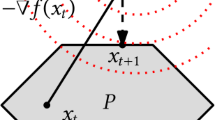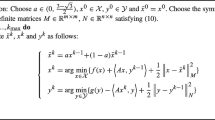Abstract
Stabilized sequential quadratic programming (sSQP) methods for nonlinear optimization generate a sequence of iterates with fast local convergence regardless of whether or not the active-constraint gradients are linearly dependent. This paper concerns the local convergence analysis of an sSQP method that uses a line search with a primal-dual augmented Lagrangian merit function to enforce global convergence. The method is provably well-defined and is based on solving a strictly convex quadratic programming subproblem at each iteration. It is shown that the method has superlinear local convergence under assumptions that are no stronger than those required by conventional stabilized SQP methods. The fast local convergence is obtained by allowing a small relaxation of the optimality conditions for the quadratic programming subproblem in the neighborhood of a solution. In the limit, the line search selects the unit step length, which implies that the method does not suffer from the Maratos effect. The analysis indicates that the method has the same strong first- and second-order global convergence properties that have been established for augmented Lagrangian methods, yet is able to transition seamlessly to sSQP with fast local convergence in the neighborhood of a solution. Numerical results on some degenerate problems are reported.
Similar content being viewed by others
References
Andreani, R., Haeser, G., Schuverdt, M.L., Silva, P.J.S.: Two new weak constraint qualifications and applications. SIAM J. Optim. 22(3), 1109–1135 (2012)
Andreani, R., Martínez, J.M., Schuverdt, M.L.: On second-order optimality conditions for nonlinear programming. Optimization 56, 529–542 (2007)
Baumrucker, B.T., Renfro, J.G., Biegler, L.T.: MPEC problem formulations in chemical engineering applications. Comput. Chem. Eng. 32, 2903–2913 (2008)
Curtis, F.E., Nocedal, J.: Flexible penalty functions for nonlinear constrained optimization. IMA J. Numer. Anal. 28(4), 749–769 (2008)
Dirkse, S.: MPECLib: a collection of mathematical programs with equilibrium constraints. http://www.gamsworld.eu/mpec/mpeclib.htm (2004)
Facchinei, F., Fischer, A., Herrich, M.: A family of Newton methods for nonsmooth constrained systems with nonisolated solutions. Math. Methods Oper. Res. 77(3), 433–443 (2013)
Facchinei, F., Fischer, A., Herrich, M.: An LP-Newton method: nonsmooth equations, KKT systems, and nonisolated solutions. Math. Program. 146(1), 1–36 (2014). doi:10.1007/s10107-013-0676-6
Facchinei, F., Fischer, A., Kanzow, C.: On the accurate identification of active constraints. SIAM J. Optim. 9(1), 14–32 (1998)
Fernández, D., Solodov, M.: Stabilized sequential quadratic programming for optimization and a stabilized Newton-type method for variational problems. Math. Program. Ser. A 125, 47–73 (2010)
Fischer, A.: Modified Wilson’s method for nonlinear programs with nonunique multipliers. Math. Oper. Res. 24(3), 699–727 (1999)
Forsgren, A.: Inertia-controlling factorizations for optimization algorithms. Appl. Numer. Math. 43, 91–107 (2002)
Forsgren, A., Gill, P.E.: Primal-dual interior methods for nonconvex nonlinear programming. SIAM J. Optim. 8, 1132–1152 (1998)
Gill, P.E., Kungurtsev, V., Robinson, D.P.: Distance-to-solution estimates for optimization problems with constraints in standard form. Center for Computational Mathematics Report CCoM 16-01, University of California, San Diego (2016)
Gill, P.E., Kungurtsev, V., Robinson, D.P.: A stabilized SQP method: global convergence. IMA J. Numer. Anal. doi:10.1093/imanum/drw004. http://imajna.oxfordjournals.org/content/early/2016/05/04/imanum.drw004.abstract
Gill, P.E., Robinson, D.P.: A primal-dual augmented Lagrangian. Comput. Optim. Appl. 51, 1–25 (2012)
Gill, P.E., Robinson, D.P.: A globally convergent stabilized SQP method. SIAM J. Optim. 23(4), 1983–2010 (2013)
Gill, P.E., Wong, E.: Sequential quadratic programming methods. In: Lee, J., Leyffer, S. (eds.) Mixed Integer Nonlinear Programming, Volume 154 of The IMA Volumes in Mathematics and its Applications, pp. 147–224. Springer, New York (2012). doi:10.1007/978-1-4614-1927-3_6
Gould, N.I.M., Orban, D., Toint, PhL: CUTEst: a constrained and unconstrained testing environment with safe threads for mathematical optimization. Comput. Optim. Appl. 60(3), 545–557 (2015)
Hager, W.W.: Stabilized sequential quadratic programming. Comput. Optim. Appl. 12(1–3):253–273 (1999). Computational optimization—a tribute to Olvi Mangasarian, Part I
Izmailov, A.F.: Solution sensitivity for Karush–Kuhn–Tucker systems with non-unique Lagrange multipliers. Optimization 59(5), 747–775 (2010). doi:10.1080/02331930802434922
Izmailov, A.F., Solodov, M.V.: Newton-type methods for optimization problems without constraint qualifications. SIAM J. Optim. 15(1), 210–228 (2005)
Izmailov, A.F., Solodov, M.V.: Examples of dual behaviour of Newton-type methods on optimization problems with degenerate constraints. Comput. Optim. Appl. 42, 231–264 (2009). doi:10.1007/s10589-007-9074-4
Izmailov, A.F., Solodov, M.V.: On attraction of linearly constrained Lagrangian methods and of stabilized and quasi-Newton SQP methods to critical multipliers. Math. Program. 126(2, Ser. A), 231–257 (2011)
Izmailov, A.F., Solodov, M.V.: Stabilized SQP revisited. Math. Program. 133, 93–120 (2012)
Izmailov, A.F., Solodov, M.V.: Critical Lagrange multipliers: what we currently know about them, how they spoil our lives, and what we can do about it. TOP 23(1), 1–26 (2015)
Izmailov, A.F., Uskov, E.I.: On the influence of the critical Lagrange multipliers on the convergence rate of the multiplier method. Comput. Math. Math. Phys. 52(11), 1504–1519 (2012)
Kungurtsev, V.: Second-derivative sequential quadratic programming methods for nonlinear optimization. Ph.D. thesis, Department of Mathematics, University of California San Diego, La Jolla, CA (2013)
Maratos, N.: Exact penalty function algorithms for finite-dimensional and control optimization problems. Ph.D. thesis, Department of Computing and Control, University of London (1978)
MathWorks Inc., Natick, Massachusetts. Matlab User’s Guide (1992)
Mostafa, E.-S., Vicente, L., Wright, S.: Numerical behavior of a stabilized SQP method for degenerate NLP problems. In: Bliek, C., Jermann, C., Neumaier, A. (eds.) Global Optimization and Constraint Satisfaction. Lecture Notes in Computer Science, vol. 2861, pp. 123–141. Springer, Berlin (2003)
Oberlin, C., Wright, S.J.: Active set identification in nonlinear programming. SIAM J. Optim. 17(2), 577–605 (2006)
Wright, S.J.: Superlinear convergence of a stabilized SQP method to a degenerate solution. Comput. Optim. Appl. 11(3), 253–275 (1998)
Wright, S.J.: Modifying SQP for degenerate problems. SIAM J. Optim. 13(2), 470–497 (2002)
Wright, S.J.: Constraint identification and algorithm stabilization for degenerate nonlinear programs. Math. Program. 95(1, Ser. B), 137–160 (2003). ISMP 2000, Part 3 (Atlanta, GA)
Wright, S.J.: An algorithm for degenerate nonlinear programming with rapid local convergence. SIAM J. Optim. 15(3), 673–696 (2005)
Acknowledgments
The authors would like to thank the referees for a number of suggestions that significantly improved the presentation.
Author information
Authors and Affiliations
Corresponding author
Additional information
P. E. Gill: Research supported by the National Science Foundation Grants DMS-1318480 and DMS-1361421.
Vyacheslav Kungurtsev: Research supported by the European social fund within the framework of realizing the project “Support of inter-sectoral mobility and quality enhancement of research teams at the Czech Technical University in Prague”, CZ.1.07/2.3.00/30.0034.
Daniel P. Robinson: Research supported by National Science Foundation Grant DMS-1217153.
Rights and permissions
About this article
Cite this article
Gill, P.E., Kungurtsev, V. & Robinson, D.P. A stabilized SQP method: superlinear convergence. Math. Program. 163, 369–410 (2017). https://doi.org/10.1007/s10107-016-1066-7
Received:
Accepted:
Published:
Issue Date:
DOI: https://doi.org/10.1007/s10107-016-1066-7
Keywords
- Nonlinear programming
- Augmented Lagrangian
- Sequential quadratic programming
- SQP methods
- Stabilized SQP
- Primal-dual methods
- Second-order optimality




